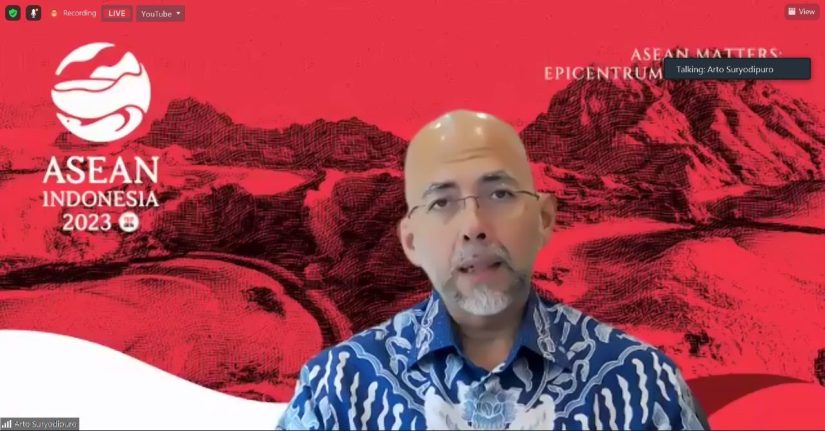
Yogyakarta, February 14th 2023─The ASEAN Studies Center (ASC) of Gadjah Mada University’s Faculty of Social and Political Science held a public seminar titled “Indonesia’s Agenda in the 2023 ASEAN Chairmanship: Challenges and Opportunities” on Tuesday (14/2). The event was held online and divided into two discussion panels. The first session raised the topic of “Geopolitical Challenges and Democracy in the ASEAN Region” and was filled by Sidharto Suryodipuro, Director General for ASEAN Cooperation in the Ministry of Foreign Affairs, as well as Amalinda Savirani, a lecturer in Fisipol UGM.
“Our discussion this morning is a part of Fisipol’s contribution to give feedback for policymakers on Indonesia’s role in its’ 2023 ASEAN Chairmanship,” Poppy Winanti, the Vice Dean of Fisipol UGM, said.
Indonesia’s chairmanship in ASEAN 2023 is an important momentum to show how Indonesia’s leadership can make ASEAN a stable and prosperous region. This is even more important when seeing that there is currently political tension, both in ASEAN and on a global scale. “The rivalry between big countries brings with it deglobalization, separation of the great powers, and new tension geopolitically,” said Sidharto. He argued that an inclusive system where everyone gets a seat at the table is a solution to the problem.
Sidharto menyebutkan berbagai agenda Indonesia dalam keketuaan ASEAN, termasuk visi jangka panjang ASEAN. Dengan ekonomi serta daya beli masyarakat yang semakin kuat, ASEAN divisikan untuk berdampak positif terhadap lingkungan, membumi untuk kepentingan rakyatnya, serta menentukan standar pada tingkat kawasan maupun global. “Kita juga menyikapi berbagai tantangan yang ada hari ini, sepeti food security, ketahanan energi, stabilitas keuangan, serta arsitektur kesehatan kawasan,” sebut Sidharto. Kemudian, Indonesia juga memprioritaskan implementasi dari ASEAN Outlook on the Indo-Pacific (AOIP) dalam bentuk kerja sama yang konkret.
Sidharto explained Indonesia’s agenda in the ASEAN chairmanship, including ASEAN’s long-term vision. With a strengthening economy and buying power of the ASEAN society, in the long term, ASEAN will be shaped into a region that can affect the environment positively, can be useful for their citizens, and a region that can set the standard for other regions or globally. “We are also responding to various threats in current times, such as food security, energy resilience, financial stability, as well as the regional health infrastructure,” said Sidharto.
Amalinda continued the discussion by explaining that the economy is the main agenda of Indonesia’s chairmanship in ASEAN. “This shows how Indonesia’s chairmanship is truly pragmatic because what the post-pandemic society is currently facing is the issue of the economy,” Amalinda said. Amalinda mentioned that the economy can hopefully be something that ties every region with the aim of a strengthening economy. “The potential is very big and strategic,” she said.
The seminar is then followed by the second-panel discussion session “ASEAN’s Opportunity as the Epicentrum of Growth”. The discussion was filled with various speakers; Ni Made Ayu Marthini, the Deputy for Marketing at the Ministry of Tourism and Creative Economy; Nella Sri Hendriyetti, Head of Center for Regional and Bilateral Policy of the Ministry of Finance; and Muhammad Rum, ASC Senior Researcher.
